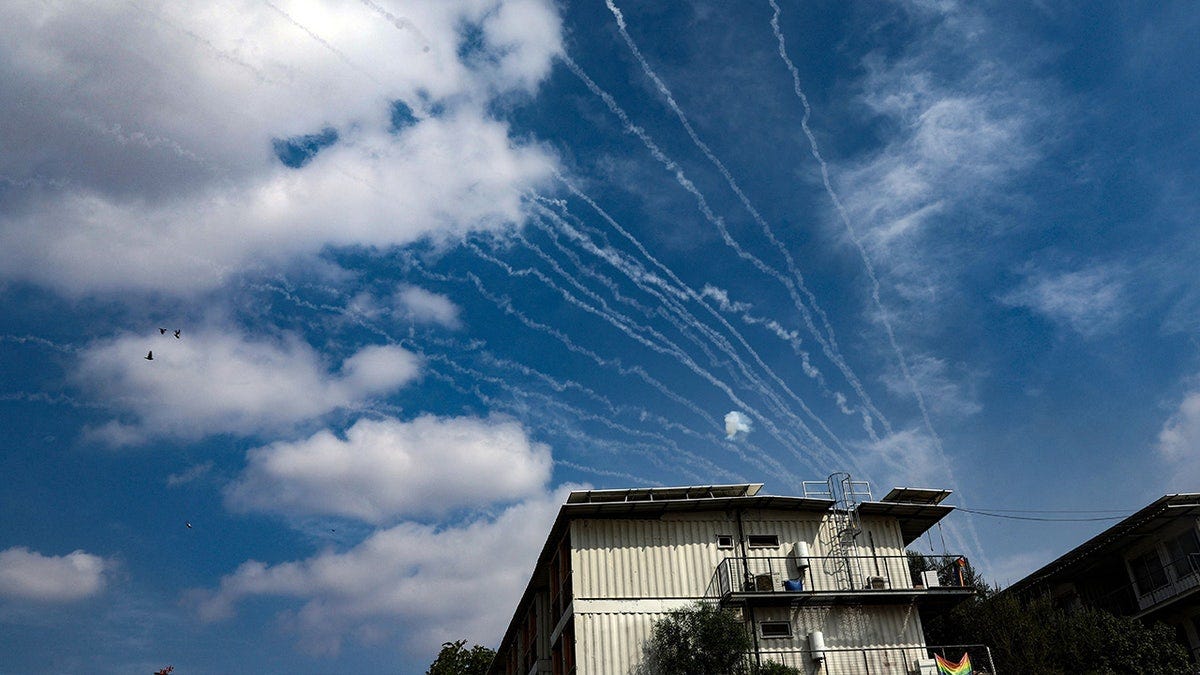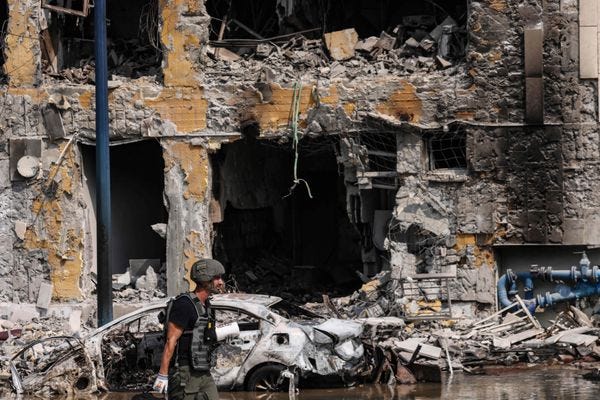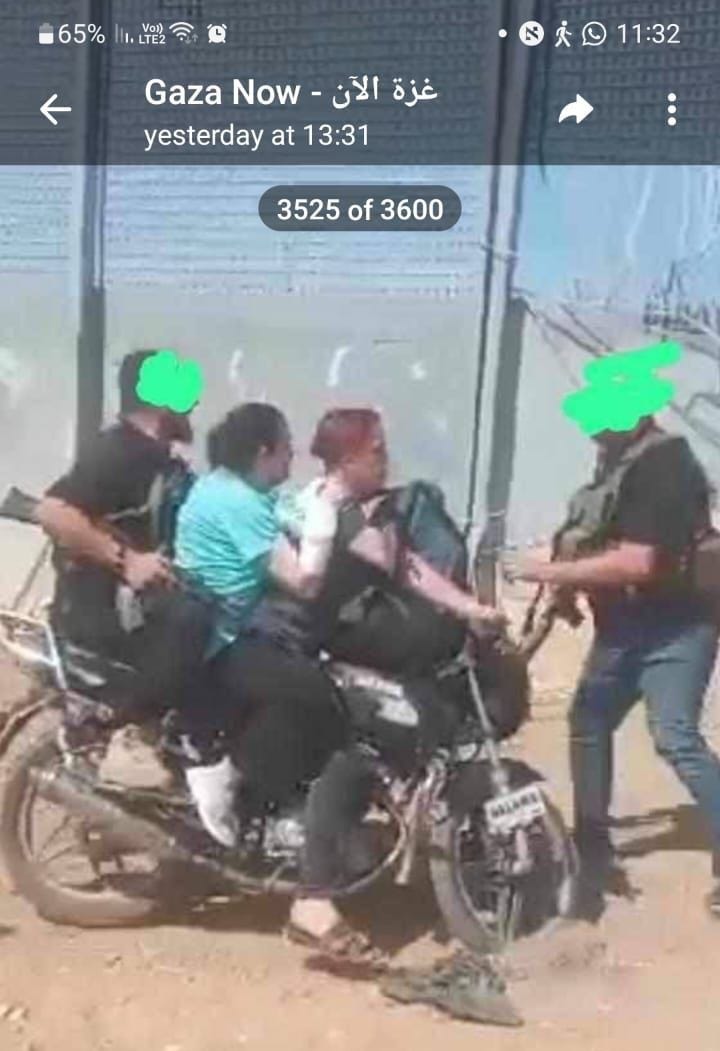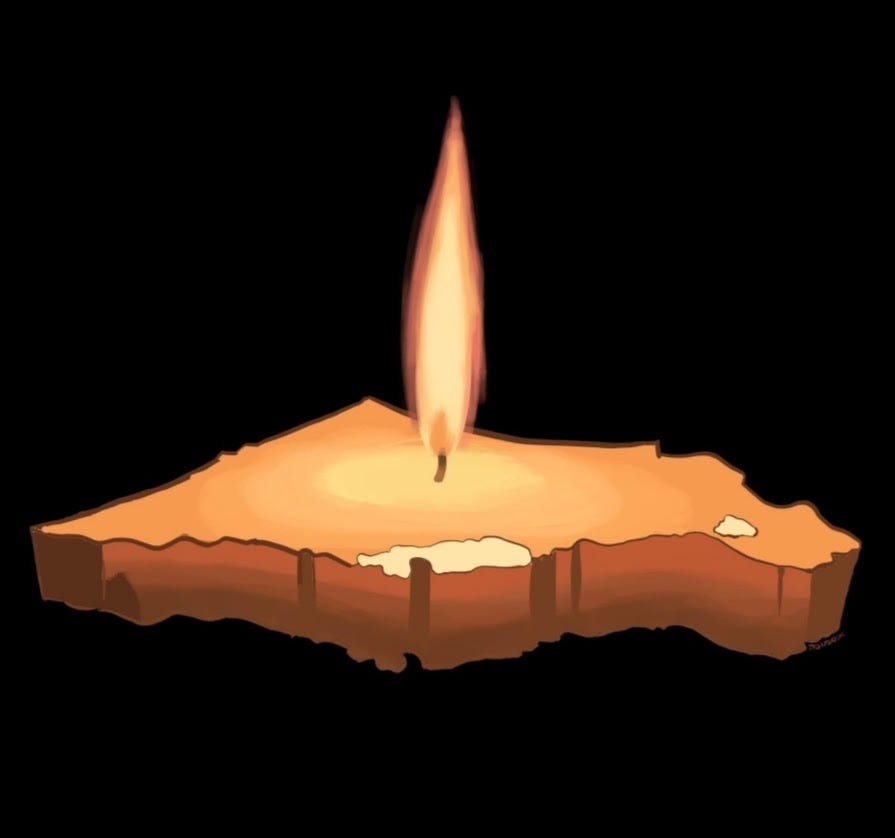Like many South Africans, I have Lithuanian roots. My maternal grandfather was one of seven children born in Lithuania. In the early 1930s, looking for new opportunities, three brothers traveled to South Africa. A fourth brother - Shafat - moved to then-Palestine, and helped found Kibbutz Alonim. Those who stayed in Lithuania were murdered during the war.
Shafat made a life for himself in Israel. He toiled on the kibbutz, married, was a soldier, and had children. One of those children later in life moved to Sderot, and had two children of his own. By October 2023, they had lived in Sderot for approximately 22 years. Despite the incessant rocket fire (no small thing to ignore) they made a home and name for themselves there. They work, their kids went to school, joined the army, they have friends, and they love living on Israel’s periphery.
On October 7 however, everything changed.
What follows in an account from my cousin Gili, now 22, of what happened on October 7 and 8, 2023. Her connection with her grandfather’s family now is that she too witnessed the evil that lurks beneath the surface of Jewish history. She is now forever linked to her forefathers in what is the never-ending story of antisemitism.
In full disclosure, Gili told me her story and I have written it in the first person for her.
Saturday morning
On Saturday morning, October 7, I was awoken by a tzeva adom, red alert. Living in Sderot for 22 years, we have become all too familiar with the sound of the air raid siren, as rockets from Gaza are launched at kibbutzim, moshavim, towns, and cities that surround Gaza.
I got out of bed, and along with my 16 year old brother Ido, and my parents, we made our way into the mamad (bomb shelter). We were still waking up, and trying to get comfortable, not expecting to be in the room for too long. We expected, like always, to hear several rockets being launched, Iron Dome intercepting them if necessary, or the distant thud of them landing in a field far away. We would then return to bed, or start with an early breakfast.
Our bomb shelter is another room in our house. It has a bed, some books, and a few other odds and ends. Like other bedrooms, there is no lock on the door because it is intended to protect from rockets, not intruders.
After about five minutes, something began to feel different. It had never quite felt this way before, and my brother and I began to look through our phones. My brother showed me a screenshot from Telegram, a picture of someone on a paraglider, coming over the Gaza border towards Sderot. We considered it briefly, dismissing it as nonsense. It was impossible, we thought, for anyone from Gaza to infiltrate Israel, by land, sea, or air. But, something felt off.
I began to message and call friends, and check social media. It seemed that something was happening, and there was early warnings of infiltrators coming to Israeli towns like Sderot. We grew nervous, my heart began to pound, and we frantically looked for advice. In the meantime, fearing the worst, we began to push whatever we had in our safe room against the wall, to barricade ourselves inside.
Terror at the door
The minutes went by quickly, and after about one-hour we began to hear gunshots. They were coming from nearby, and were getting closer. We looked outside, but did not see anything out of the ordinary yet. We all turned to our phones to get updates, and were flooded by messages from friends nearby.
Terrorists had infiltrated Israel. We did not know how many, but we believed it was thousands, because in every town near Gaza, it seemed like there had been an alert. I spoke with friends at Kibbutz Nahal Oz and Kfar Aza. They told me that they saw terrorists walking through the kibbutz, and that they were executing any Israeli they found. As the gunshots grew louder outside, we looked and saw them outside our house too. They were driving jeeps and trucks, speeding around like in a video game, and shooting at whomever they saw. We saw friends and neighbours shot with our own eyes.
I have never felt so scared in my life. I was in this room with my parents and brother, the people I love the most in the world, and felt helpless. All we could do was monitor the news unfolding on our phones and hope, and pray, that no one knocked on our door or entered our house.
The terrorists used social media to broadcast their crimes. In some cases, they used their victims’ phones to film their murder, or stream it live for the victims’ friends. Together with my parents, we saw one of my father’s friends have his two young children murdered - shot - before his eyes. We saw the terrorists take our friend’s grandmother’s phone, and film her murder, posting it on her own Facebook profile. Even today, almost two weeks later, it still doesn’t feel real. It was like a movie. I still can’t believe it happened.
Speaking to, and losing touch with, friends
As the hours passed by, I continued to speak with friends, but many soon stopped responding. I could not understand why the police had not been dispatched, and why armed Israelis had not defended our towns. I soon learned that the Sderot police station had been overrun by terrorists early, who had killed all the officers. I also learned that there was no significant army presence that day because it was Shabbat, and Shmini Atzeret.
I soon realized that my friends who were not responding may be silent not just because their attention was elsewhere, but because they had been killed. Even worse, we began to see reports online that the terrorists were kidnapping Israelis, old, young, men, women, babies, and grandmothers, and taking them back to Gaza.
In the afternoon, we saw a terrorist approach our house. He was armed with a machine gun, dressed as a soldier, wearing a bullet-proof vest. He walked up our steps and approached our front door. For whatever reason, he turned and left. I will never forget what I felt in those few moments, or how tightly I held onto my family.
A picture was circulated online of an old woman in a blue shirt being held on a motorcycle driven by Hamas terrorists. We immediately identified her as Alma, my grandmother’s best friend. She had been kidnapped and taken into Gaza. She is 84 years old. She was like another grandmother to us. We have no idea what has happened to her.
Time flew by that day. We continued to monitor what was happening online, but our fear, and not knowing what would happen next, made us forget that we had not eaten anything for hours, not gone to the bathroom, and not left that small little room all day. Suddenly it was night.
We witnessed hell
That day we witnessed brutality like you could never imagine in your worst nightmares. We saw our neighbours and friends executed, their bodies left, dusty, on the street, for hours. We saw videos on our phone of the most brutal and horrific murder that one could imagine. We read reports of what had happened at the Nova music festival nearby, where I knew some of my friends were, hearing that terrorists had simply gunned down young people having a good time. We heard that people were raped, and killed. We were forced to think about who it was we knew there. It turned out that we did it fact know many of the victims.
That night, we hardly slept. We only have one bed in our safe room, but even so we were too scared to put our heads down. We remained vigilant, nervous of every sound.
People kept calling and messaging to check up on us, but we did not know what to say. We did not want people to be nervous for us, and we told them that we were still in the house, but that we could not yet leave. Many asked us how this could happen, but it was too soon to answer such questions. We just wanted to leave.
Sunday morning
As the sun rose on Sunday morning, we decided that we would try to drive up north to be with family near Tel Aviv. But the reports that we were reading, or what we were hearing from contacts outside, was that there were still terrorists hiding throughout the community. Though the army and the police had arrived and neutralized hundreds of terrorists, we did not know how many had breached our border, and so we did not know how many remained, dead or alive.
My parents and I wanted to protect my younger brother. He was terrified, not just because of the risk we still faced, but because of how we knew, no doubt, that our lives in Sderot had changed forever. Hearing some quiet for some time, we decided to quickly leave the shelter, grab a few clothes and things from our rooms, and head to our car to escape Sderot.
Leaving the shelter was terrifiying. Exiting our house was terrifying. Not knowing if our car was still standing outside, and whether we would have a way to escape, was terrifying.
We got into our car and began to drive as quickly as we could. On the way out, we could not believe our eyes. The entire face of Sderot had changed. Dead bodies, of our friends and neighbours, were scattered on the streets and sidewalks. Houses of friends and people we knew had been burned down, scorched when terrorists burned car tires and rolled them into houses, trying to flush out people inside. We saw cars with bodies inside, including a good friend of my brother’s. Cars were burned, and we thought we saw burned bodies too. It was a scene that will never leave my mind.
We drove north as fast as possible. We did not know if there were still terrorists hiding, shooting at civilians, or taking more hostages. We did not know how far north they had infiltrated, so we drove fast. We arrived at our cousins near Tel Aviv a few hours later, shocked, deflated, and really not understanding what had happened. But we made it together, the four of us.
Assessing the damage
That afternoon, we tried to reach out to as many friends as we could. We learned, like the rest of the world, the extent of the atrocities. Of thousands of terrorists infiltrating homes, of executions, of hostages, of burned and shot bodies, of rape, and of torture. Together with my family, we learned that hundreds of people we knew were either dead, or missing. We had so many close friends at Kfar Aza, and they are gone. My brother and I went to school at Shaar Hanegev, where many students from the surrounding communities went. As of today, I can only guess that about half the people I went to school with have died. I cannot even begin to explain how it feels to say that. People that we know from all walks of life, from school, work, people who I went to the army with, people I partied with, my parents’ friends. So many people are dead.
I learned that a good friend of mine nearby was in her shelter with her boyfriend. Suddenly, a terrorist threw a grenade into the shelter. Her boyfriend, having no other choice, jumped on the grenade, trying to save her. It exploded, and he was killed. Not wanting to expose herself to the terrorists, she stayed hidden in the shelter with her boyfriend’s body for another 10 hours.
Along with hundreds of thousands of other Israelis, I tried to push aside my emotions while I put on my uniform, and reported for duty. An unimaginable catastrophe had befallen the people of Israel, and there was a response to plan. I, along with the rest of the country, knew that whatever divided us in the past, whatever politics pushed us apart, would now be forgotten. We needed to unify to defeat evil.
Aftermath
For several days now, I have been hard at work. I have been so busy, that I have not had a chance to really let the memories of that awful day sink in. When I have a moment though, I do think about what I have lost. Sderot will never be the same, as it became one of several sites of the worst pogrom since the Holocaust. How can we ever return there, and if not there, then where else is there for us to go? I dream of sitting in a restaurant, of laughing with my friends, but so many of them are gone. I don’t know how I could ever do that again. Many of my friends are dead. Their parents are dead. Babies are dead. Our old life is missing, held hostage in Gaza.
I discovered that a friend of mine has been taken hostage. In fact, we know a few people now identified as being held in Gaza. I don’t know how to feel about it. Of course, I wish they would be returned, but I cannot imagine what hell they are going through, physically and mentally tortured by Hamas. I don’t know if I should be wishing that they had been killed, and spared that fate, or whether I should simply be praying for their quick return.
On October 17, approximately 20 funerals were held for people I knew and loved. It is hard to imagine each one’s face, and the fear that each faced, immediately before their murder. There is a lot of talk about the number of people who were killed, about 1,400, but it is important to think that each one had a face, and a name, and a story, and a family.
Sderot
I know that people in the rest of Israel, and even abroad, are sometimes surprised when I say that I’m from Sderot. People think that it is a hard place to live, and that our “claim to fame” is the red alert air raid siren, that has been a part of my life for far too many years. But Sderot was my home. I had my family there, a home, friends, and a community. But that day, so much of my life was taken from me. It is a miracle that we are still alive. It is a miracle that a terrorist chose this house, or that neighbour, but not ours. I have terrible guilt for surviving, which I cannot imagine will ever go away. Everything has changed.
My family and I are lucky that life will go on, but I cannot imagine that anything will be normal again. I also know that writing this today is just the beginning.
As I write, our leaders are planning what comes next. Our army, including reservists made up of my cousins, friends, and colleagues, are planning to eliminate the terror group that has taunted me with their rockets my whole life. The American President was here to show support, for which we are grateful.
I pray for the swift elimination of Hamas, and I hope that this war does not last long. I also hope and pray that the hostages are quickly returned, as it is impossible to imagine children - yes, children - being held hostage, away from their families. To fight, I understand. To kill babies and kidnap children, I cannot. It is not human.
I wanted to share the above because I am now a survivor. Having spoken to others who made it through that day, I sometimes feel like I should not be telling my story, because I did not come face to face with evil - I was not at the music festival, and thank God, none of my immediate family was killed. But I keep telling myself that I was there, and that I did see the gates of hell. I feel that people should know what happened that day, from everyone who witnessed it.
Already, people are trying to distort what happened, and to deny the cruelty that once again targeted our people. But I can tell you that I saw with my own eyes the inhumanity of that day. The terrorists tried to document it themselves, sharing photos and videos with the world, proud of their atrocities. They were not like the Nazis who sometimes tried to hide what they were doing from the world. Hamas put their cruelty on display for everyone to see. I saw houses and people burned, babies murdered, friends and soccer coaches lying dead on the street or in their cars, and I will never forget the fear we felt.
I will do whatever I can to make sure that no Israeli will ever have to feel that way again, and I know that we here in Israel are more determined than ever to fight, and win.
Am Yisrael Chai.











Thank you for publishing this. What a horrifying experience to live through. The first hand accounts should be broadcast around the world so people hear the atrocities of what was committed without media distortion.